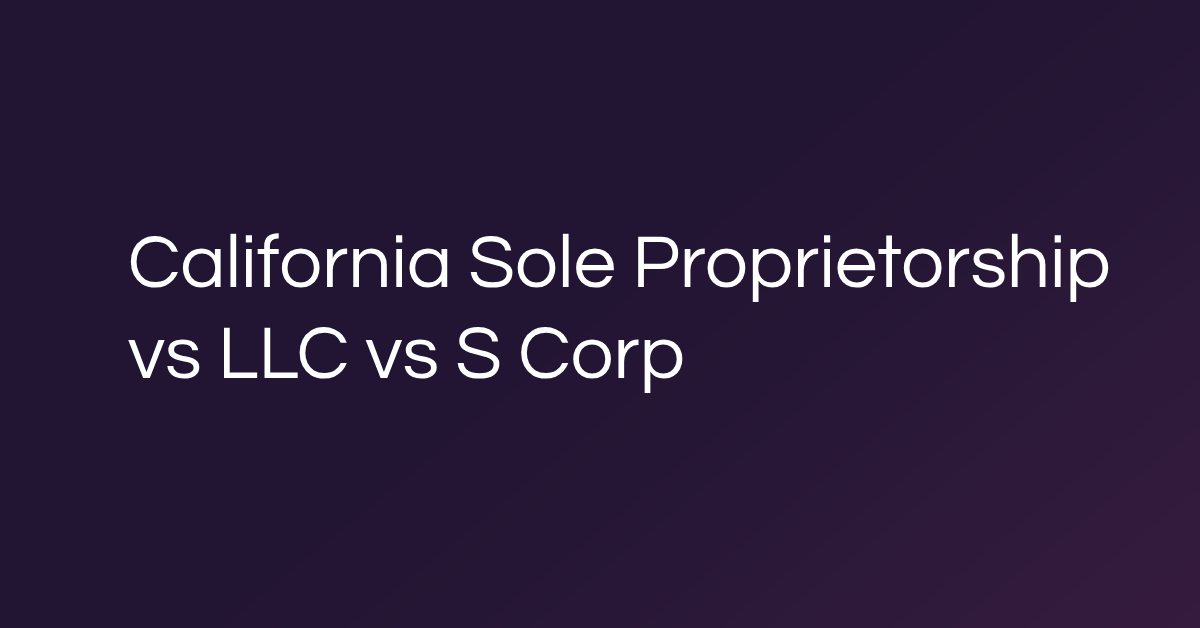Breaking free from the nine-to-five grind and building something of your own in California is an exciting step — but choosing the right business structure can make or break your success. If you’re freelancing or consulting on the side, you may have started as a California sole proprietor without giving it much thought. While this setup is simple and low-cost, it also leaves you personally responsible and exposed to various business risks and/or liabilities.
For entrepreneurs in California, forming a Limited Liability Company (LLC) or S corporation offers a better way to protect personal assets, unlock tax advantages, and create a business built for growth.
What is a sole proprietorship in California?
A sole proprietorship is the simplest way to operate a business. It requires no formal registration beyond obtaining necessary business licenses or permits. The company and the owner are legally the same in this structure, meaning all profits, debts, and liabilities fall directly on the individual.
Sole proprietorships are popular among freelancers, independent consultants, and small business owners due to their low-cost and hassle-free setup. Since sole proprietors have no partners or shareholders, they retain full control over business decisions.
However, California sole proprietors must comply with state regulations, such as obtaining the correct:
- Business licenses
- Zoning
- Permits
- DBA registration if operating under a name other than their legal name
Additionally, a California sole proprietorship is subject to California self-employment taxes, which can significantly impact earnings.
Because this structure lacks legal separation between the business and owner, many entrepreneurs establish an LLC for liability protection and tax flexibility. California business owners can explore different structures designed to support long-term financial security.
Advantages and disadvantages of a California sole proprietorship
A sole proprietorship is an attractive option for new business owners due to its simplicity, but it has significant drawbacks. While it allows for an easy start, the lack of legal protection and financial limitations can create long-term challenges.
Advantages of a California sole proprietorship
- Simple and low-cost setup: Sole proprietorships require minimal paperwork, and business owners don’t need to file separate tax returns for their business income.
- Full control: Since sole proprietors are not partners or shareholders, they have complete decision-making power over their business operations.
- Straightforward taxes: Business earnings are reported on the owner’s personal tax return, eliminating the need for corporate tax filings.
Disadvantages of a California sole proprietorship
- Unlimited personal liability: Sole proprietors are personally responsible for business debts and legal claims, meaning their assets could be at risk in the event of a lawsuit or financial setback.
- Limited growth and funding: Raising capital can be challenging since banks and investors typically prefer structured business entities like LLCs or corporations.
- Tax burden: Self-employment taxes in California can take a significant portion of earnings, and sole proprietors don’t have the tax flexibility of LLCs or S-corps.
Transitioning to an LLC can provide more long-term stability. Entrepreneurs exploring this option can gain more insights into business risks and strategies for minimizing financial exposure.
Why consider an LLC in California?
Sole proprietorships may be easy to start, but a California LLC provides several key advantages for small business owners and entrepreneurs.
- Personal asset protection: Business debts and lawsuits do not put personal savings or property at risk.
- Tax options: LLCs can use pass-through taxation or elect S-corp status for tax savings.
- Credibility and growth: A California LLC offers more legitimacy to clients, lenders, and investors.
- Flexible management: Business owners can operate alone or add partners without complex restructuring.
While California requires LLCs to pay an annual franchise tax, the liability protection and financial security benefits often outweigh the costs.
Comparing a California sole proprietorship and an LLC
Which is right for you? Deciding between a California sole proprietorship versus a California LLC depends on your liability, taxation, and long-term business goals:
- Legal protection: Sole proprietors do not separate personal and business finances, putting personal assets at risk. LLCs create a legal distinction, shielding owners from business-related liabilities.
- Taxation: Sole proprietors report all income on personal tax returns and pay self-employment taxes. LLCs have tax flexibility, allowing owners to choose pass-through taxation or elect S-corp status for potential tax savings.
- Business growth: Raising capital is more challenging for sole proprietors since banks and investors prefer structured entities. An LLC provides more credibility and opportunities for business expansion.
- Compliance and costs: Sole proprietorships require minimal paperwork and no formal registration. LLCs must file formation documents, pay California’s annual franchise tax, and maintain compliance with state regulations.
Steps to transition from a California sole proprietorship to an LLC
Transitioning from a sole proprietorship to an LLC in California requires following legal and administrative steps to ensure compliance and business continuity.
- Choose a business name: Ensure the name is unique and complies with California’s naming rules. Check availability through the California Secretary of State’s business search.
- File articles of organization: Submit Form LLC-1 with the California Secretary of State and pay the required filing fee.
- Create an operating agreement: While not mandatory, this document outlines ownership and management structures.
- Obtain an EIN: Get a free Employer Identification Number (EIN) from the IRS for tax purposes.
- Update licenses and permits: Re-register business licenses to reflect your new LLC status.
Take control of your business with a California LLC
Starting as a sole proprietor might feel like the easiest path, but it’s not always the smartest. Without liability protection, your assets are on the line, growth opportunities are limited, and tax burdens can add up fast.
Forming a California LLC gives you more control over your financial future. If you’re serious about building something sustainable, switching to an LLC isn’t just an option — it’s a strategic move for long-term success.
With Besolo’s Solo LLC package, setting up an LLC is simple. Our platform streamlines the process, including business registration and taxes in California, so you can focus on growing your business while we handle the paperwork. Let Besolo guide you through setting up a California LLC — become a member today!








